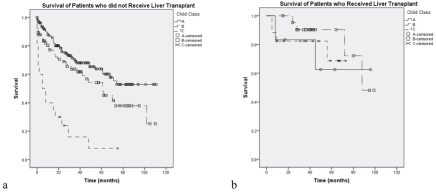Advanced Liver Care and Salvage Transplantation Improves Outcomes for Patients with Cirrhosis Requiring Abdominal General Surgical Procedures
1Department of Surgery, Indiana University School of Medicine, Indianapolis, IN
2Department of Transplant Surgery, University of Alabama School of Medicine, Birmingham, AB.
Meeting: 2018 American Transplant Congress
Abstract number: B271
Keywords: Liver cirrhosis, Liver failure, Liver transplantation
Session Information
Session Name: Poster Session B: Liver: Hepatocellular Carcinoma and Other Malignancies
Session Type: Poster Session
Date: Sunday, June 3, 2018
Session Time: 6:00pm-7:00pm
 Presentation Time: 6:00pm-7:00pm
Presentation Time: 6:00pm-7:00pm
Location: Hall 4EF
Introduction: Historically, abdominal general surgical procedures on cirrhotic patients carry up to an 80% mortality rate. We hypothesized outcomes of cirrhotic patients requiring abdominal surgical procedures have improved at specialized centers, and specifically those that have the capability for salvage transplantation.
Methods: A retrospective analysis of a series of 301 patients at a single institution was performed. Patients were cirrhotic and undergoing abdominal general surgeries between 2004–2014. Statistics were performed using SPSS.
Results: 301 patients were identified: 54.5% male, median age 56.3±12.8, BMI 29.0±7.9, and Charlson Index 3.0±2.1. The most common surgeries were herniorrhaphy (n=95,31.6%), cholecystectomy (n=57,18.9%), and hepatectomy (48,15.9%). Control of ascites, encephalopathy, and portal hypertension was obtained perioperatively through medical management (n=154,51.2%), repeat large volume paracentesis (n=39,13.0%), and TIPS placement (n=22,7.3%). 90-day survival following abdominal general surgical procedures for Child A patients was 96.4%, Child B 90.6%, and Child C 75.7%. Overall, 15.0% (n=45) of patients progressed to liver transplantation in an average of 390.7±66.7 days (range 5–1925 days). Only 3.6% of Child A patients, but 22.9% of Child B and 46.0% of Child C patients underwent transplantation. Child B and C patients who underwent transplantation had significantly improved mean and median survivals. 
Conclusion: Aggressive perioperative management of ascites, encephalopathy, and portal hypertension, as well as application of salvage liver transplantation were implemented at our institution. This series demonstrates that outcomes for patients with cirrhosis undergoing abdominal general surgical procedures can be dramatically improved. These data support regionalization of care for cirrhotic patients and earlier evaluation for transplantation.
CITATION INFORMATION: Milgrom D., Valsangkar N., Kays J., Liang T., Butler J., Kubal C., Maluccio M., Tector A., Koniaris L. Advanced Liver Care and Salvage Transplantation Improves Outcomes for Patients with Cirrhosis Requiring Abdominal General Surgical Procedures Am J Transplant. 2017;17 (suppl 3).
To cite this abstract in AMA style:
Milgrom D, Valsangkar N, Kays J, Liang T, Butler J, Kubal C, Maluccio M, Tector A, Koniaris L. Advanced Liver Care and Salvage Transplantation Improves Outcomes for Patients with Cirrhosis Requiring Abdominal General Surgical Procedures [abstract]. https://atcmeetingabstracts.com/abstract/advanced-liver-care-and-salvage-transplantation-improves-outcomes-for-patients-with-cirrhosis-requiring-abdominal-general-surgical-procedures/. Accessed July 2, 2025.« Back to 2018 American Transplant Congress
